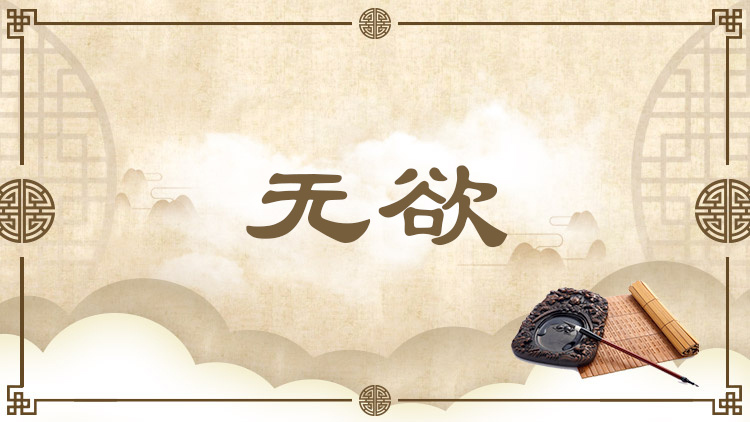无欲 Having No Excessive Desire

没有过度的欲望。“欲”主要指人为外物所感而产生的欲求。这样的欲求作为人得以生存的必要条件,应该获得适当的满足。但过度的欲望会造成对自身生命的伤害,也会导致道德的沦丧及社会秩序的混乱。因此儒家和道家都主张“无欲”。此外,在道家思想中,“无欲”有时特指道对待万物、为政者对待百姓的一种态度,即为政者节制自身的欲望,不去刺激百姓的欲望。
Yu (欲) means the desire people have when they are attracted by external objects. Such desire, as the condition necessary for existence, should be suitably met. However, excessive desire is detrimental to one's life and will lead to a decline in public moral and result in social chaos. So both Confucianism and Daoism are against excessive desire. In addition, in Daoist thinking, "having no excessive desire" refers to Dao's attitude towards everything and how those in power should handle their relations with the common people. Daoism believes that those in power should suppress their desire and refrain from arousing people's desire.
引例 Citations:
◎子曰:“吾未见刚者。”或对曰:“申枨。”子曰:“枨也欲,焉得刚?”(《论语·公冶长》)
孔子说:“我没见过刚正的人。”有人回应说:“申枨就是。”孔子说:“申枨欲望太多,哪里能够刚正呢?”
Confucius said, "I have never seen any person of rectitude." Someone responded, "Shen Cheng is such a person." Confucius said, "Shen Cheng has too many desires. How can he be of rectitude?" (The Analects)
◎故圣人云:我无为而民自化,我好静而民自正,我无事而民自富,我无欲而民自朴。(《老子·五十七章》)
所以圣人说:我无为则民众自己化育,我好静则民众自己端正,我不多事则民众自己富足,我不多欲则民众自然朴实。
Therefore, the sage said, "People know how to cultivate themselves when I do nothing to interfere. They will behave themselves when I keep quiet. They will prosper when I am out of the way; and they will be sincere and honest when I hold my desire in check." (Laozi)
推荐:教育部 国家语委
供稿:北京外国语大学 外语教学与研究出版社
责任编辑:刘怿莎





